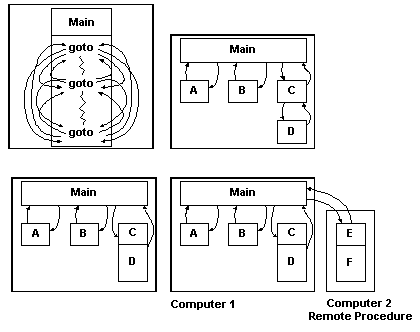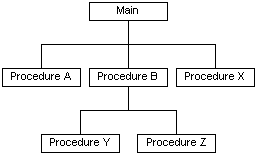
In the early days of computing, each program was written as a large monolithic chunk, filled with goto statements. Each program had to manage its own input and output to different hardware devices. As the programming discipline matured, this monolithic code was organized into procedures, with the commonly used procedures packed in libraries for sharing and reuse. Today's RPC is the next step in the development of procedure libraries. Now, procedure libraries can run on other remote computers.

The C programming language supports procedure-oriented programming. In C, the main procedure relates to all other procedures as black boxes. For example, the main procedure cannot find out how procedures A, B, and X do their work. The main procedure only calls another procedure; it has no information about how that procedure is implemented.

Procedure-oriented programming languages provide simple mechanisms for specifying and writing procedures. For example, the ANSI standard C function prototype is a construct used to specify the name of a procedure, the type of the result it returns, if any, and the number, sequence, and type of its parameters. Using the function prototype is a formal way to specify an interface between procedures.
In this guide, the term procedure is synonymous with the terms subroutine and subprocedure and refers to any sequence of computer instructions that accomplishes a functional purpose. In this documentation, the term function refers to a procedure that returns a value.
Related procedures are often grouped in libraries. For example, a procedure library can include a set of procedures that performs tasks common to a single domain such as floating-point math operations, formatted input and output, and network functions.
The procedure library is another level of packaging that makes it easy to develop applications. Procedure libraries can be shared among many applications. Libraries developed in C are usually accompanied by header files. Each program that uses the library is compiled with the header files that formally define the interface to the library's procedures.
The Microsoft RPC tools represent a general approach in which procedure libraries written in C can run on other computers. In fact, an application can link with libraries implemented using RPC without indicating to the user that the application is using RPC.